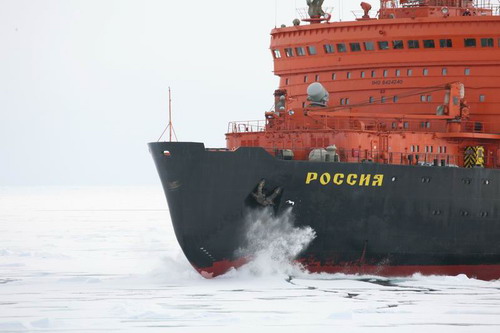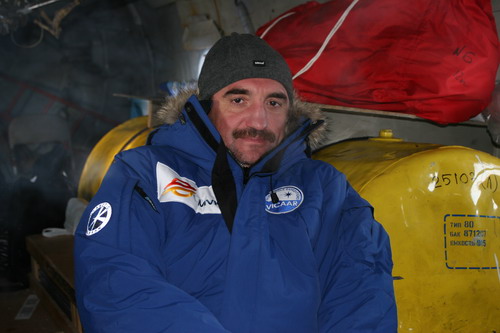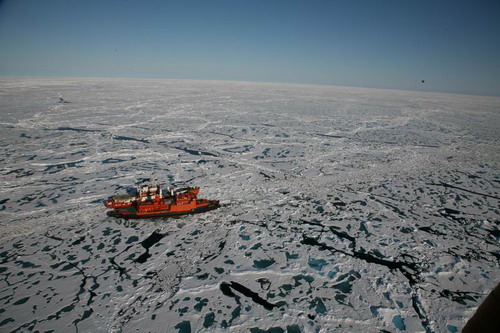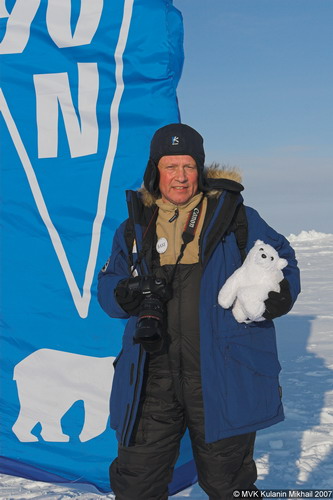The second stage of arktika’2007 has started
Today at 5am Moscow time the international crew of the research drifting station North Pole-35 arrived at Tiksi, Vladimir Filatov informed us on the phone.
The crew has settled at the research vessel Akademik Fedorov, which is now remaining off Tiksi harbour. Yesterday at 8pm the participants of the exhibition took off from Saint-Petersburg.

The MVK International Exhibition Company was the expedition’s information partner and highlighted the historic dive of deep-water manned vehicles “Mir”. Now the MVK team will work during the second stage of Arktika’2007.
The exhibition is aimed at finding an appropriate ice-floe and organizing the drifting station “North Pole-35”. The ice-breaker Russia and research vessel Akademik Fedorov will join in early September in the Chukotskoe Sea. The vessels will head north from the Novosibirsk islands, towards the ice-floe chosen with the scenes images and observed by the research workers of AARI. The helicopters will deliver houses, research equipment and 35 polar explorers to the drifting ice-floe. The NP-35 research station will work for about a year. NP-35 research team will be international. There will be the representatives of national polar associations from Russia, Germany, USA and France.

According to Vladimir Sokolov, the Head of the High-Latitude Arctic Expedition, the research expedition was launched in the framework of the International Polar Year. The Arktika’2007 expedition started on July 10th, 2007. Sokolov stated that such a multidimensional expedition has not been held for 15 years.
“Research studies performed on the Akademik Fedorov will contribute to explain the processes taking place in the high latitudes of the Arctic”, highlighted Sokolov. The Arctic Ocean chills the process of global warming a bit. Nevertheless, the research done two years ago showed that some areas of the Arctic Ocean and Arctic basin are the sources of carbon dioxide. It is a very interesting factor which will be investigated in detail. For 8 months Russian researchers together with their German colleagues from the Vegener’s Institute will make a probe of the ozone layer at a height of 25 km every day. It is very important in connection with the ozone holes theories in the Arctic and Antarctic.

2007 is a jubilee year for Russian polar explorers and a year rich in outstanding events. 70 years ago the 1st drifting research station “NP-1” started its work and systematic studies of the Arctic Ocean and polar areas.
During the research station’s organization MVK team members Vladimir Filatov and Anatoly Chubar will highlight the events. The expedition’s materials will be included in the polar museum’s display.
The MVK International Exhibition Company organized the Mobile Polar Museum “The Role of History in Life and Business”. It is devoted to the 70th anniversary of the two heroic expeditions: Otto Schmidt’s first Soviet drifting polar station “NP-1” and Chkalov and Gromov’s flights over the North Pole. This historic and patriotic project is aimed at telling the citizens of Russia about its history, heroes and their great achievements. The museum’s first exhibition was organized at the North Pole.

Yury Chubar, the expedition’s photographer.
The display includes the polar explorers’ personal things, archive documents and newsreel. The exhibits were granted by seven Russian museums, Polar Explorers’ Association and families of Vodopianov and Schmidt. The Polar Museum’s portable display is going to be demonstrated in Moscow, Saint-Petersburg, Kazan, Novosibirsk, Yekaterinburg, Rostov-on-Don. In summer it was exhibited in the State Duma. The museum is expecting over 1.5 million people.
MVK participation in the expedition Arktika-2007 is the next step in the polar museum development aimed at the popularization of polar professions among the youth, inspiring patriotism and love for the Arctic.
